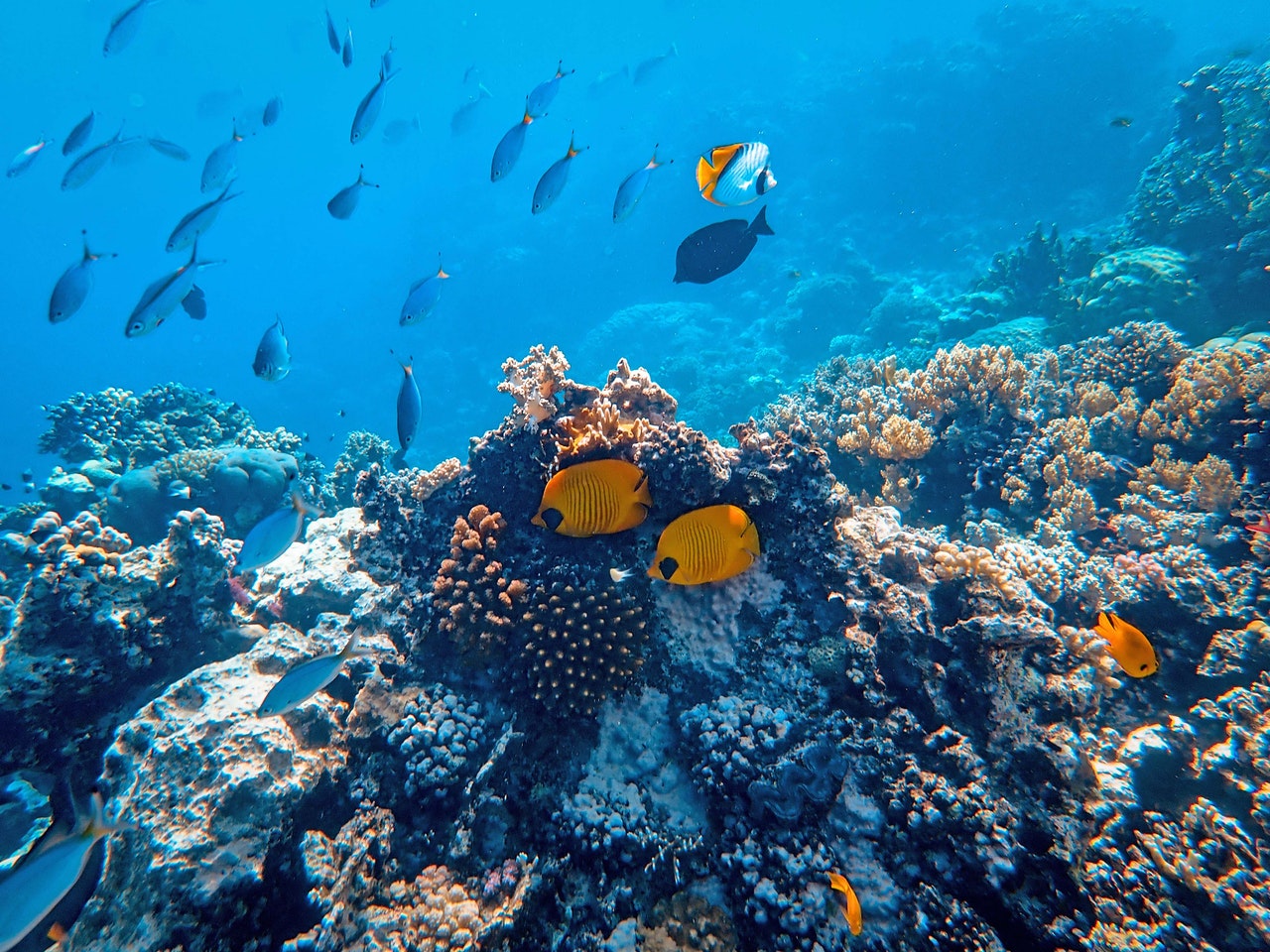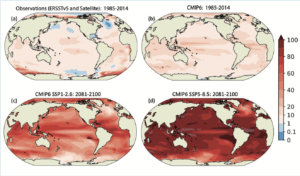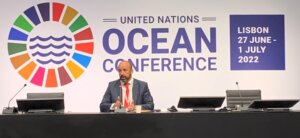From June 27 until July 1, 2022, Lisbon hosted the United Nation Ocean Conference, with the overarching theme being the scaling up of ocean action, based on science and innovation for the implementation of SDG 14: conservation of oceans and marine resources. Over 6,000 participants attended the week-long conference, including 24 Heads of State and Government, officials of intergovernmental organizations, over 2,000 representatives of civil society organizations, and other stakeholders.
The UN Conference once again established that the oceans are at the center of the global climate: they mediate temperature and drive the weather, determining rainfall, droughts, and floods. The world’s oceans cover more than 70% of earth’s surface and produce more than half of all oxygen. Marine and coastal habitats host between 700,000 and 10 million species, and millions of bacteria and microbes, with many more yet to be discovered. The adaptive capacities of oceans and marine ecosystems are not only responsible for thriving biodiversity and coral reefs but underpin the entire planet’s life support system. Oceans serve as the largest carbon sink – storing approximately 50 times more carbon than the atmosphere and processing 83% of the global carbon cycle. Beyond regulating the Earth’s system, the oceans produce natural resources and create jobs for billions of people worldwide. Modest estimates suggest that nearly 2.4 billion people (40% of the world’s population) continue to live within 100 kilometres of the coast, and over three billion people work in ocean-based sectors. Seafood and aquaculture from the ocean are critical for global food security, providing around 20% of animal protein and 6.7% of all protein consumed worldwide. With its food, fuel, medicines, and transportation contributions, the oceans are valued at US$24 trillion, making the oceans the 8th largest economy globally.
However, the health of the world’s oceans is also declining at an alarming rate. The latest IPCC report revealed that climate change has affected ocean and coastal ecosystems in unprecedented ways, with non-climate drivers exacerbating the effects of climate-impact drivers. Human pressure has spread throughout the oceans due to the increasing demands of an expanding world population. More than a third of fish stocks are overexploited, and almost 60% of fish stocks are shed at their maximum sustainable limit. Only 10-30% of coral reefs are expected to survive a world that warms to 1.5°C above pre-industrial levels due to increasing marine heatwaves and ocean acidification causing coral bleaching.
 Observed and simulated regional probability ratio of marine heatwaves (MHWs) for the 1985–2014 period and for the end of the 21st century under two different greenhouse gas emissions scenarios. Copyright: IPCC Sixth Assessment Report WG1, 2021
Observed and simulated regional probability ratio of marine heatwaves (MHWs) for the 1985–2014 period and for the end of the 21st century under two different greenhouse gas emissions scenarios. Copyright: IPCC Sixth Assessment Report WG1, 2021
“The ocean, for a long time, was able to buffer the increase in global temperature, but now it’s no longer able to do so. It’s urgent to fight the signs of saturation, because now it can no longer perform this cooling function” – Ms. Assunção Cristas, former Portuguese Minister of Agriculture and Oceans
Governments were expected to reach a consensus on global action to protect our oceans, with experts calling for an ambitious and robust post-2020 global biodiversity framework. Mr. Serpa Soares, the Under-Secretary-General for Legal Affairs noted that “The UN Ocean Conference gives great hope that there is the necessary political will to secure the future of the ocean” adding that “it is not too late to break the cycle of biodiversity loss and break the ocean Warming and acidification and ocean pollution. But we can’t waste any time.”
Against this backdrop, the UN Member States unanimously adopted the Lisbon Declaration, a 17-paragraph document that calls upon all stakeholders to take global and ambitious action to expedite implementation of SDG 14. The Declaration includes a suite of science-based and innovative actions, while also acknowledging the capacity challenges that developing countries are facing, in particular the Small Island Developing States and Least Developing Countries that are at the frontline of climate change. Along these lines, the Alliance of Small Island States (AOSIS) launched the Declaration for the Enhancement of Marine Scientific Knowledge, Research Capacity and Transfer of Marine Technology to Small Island Developing States. Permanent Representative of Grenada to the UN, Ms. Keisha McGuire said that the Declaration demonstrates “our joint commitment to raise our ambitions”, stressing that all are needed to work together across borders, regions, sectors and people to implement change, a vital component of the solution.
Besides the signing of the Lisbon Declaration, some key stakeholders have strengthened their voluntary commitments. For instance, the European Investment Bank will invest an additional €150 million to improve climate resilience, water, and waste management in the Caribbean. The Global Environmental Facility, as well as the Development Bank of Latin America have announced additional investments in projects that benefit the oceans. Portugal committed to ensure that all marine area under Portuguese law is under Good Environmental State by 2030. Furthermore, both India and Kenya have announced that that they will tackle plastic pollution, and in particular marine plastic litter. India has already followed through and introduced a ban on single-use plastics starting on July 1st of this year. A couple of other countries, including the United States, Chile, Norway, and Singapore committed to take concrete action towards green shipping, including carbon accounting by shipping companies and research on low-carbon maritime fuels.
 Mr. Miguel de Serpa Soares speaking at this year’s UN Ocean Conference. Copyright: United Nations (2022)
Mr. Miguel de Serpa Soares speaking at this year’s UN Ocean Conference. Copyright: United Nations (2022)
“The Conference has been an enormous success. It has given us the opportunity to highlight critical issues and generate new ideas and commitments. But it has also shed light on the work that remains, and the need to scale this up and raise ambition for the recovery of our ocean” – Mr. Miguel de Serpa Soares, Under-Secretary-General for Legal Affairs and United Nations Legal Counsel
The Conference was considered to be successful in terms of aligning commitments and ambition, but it ended with a call for more financial resources to address the dire state of the ocean. The path to save our oceans will continue, with the Post-2020 Global Biodiversity Framework negotiations and COP27 taking place later this year.

 Observed and simulated regional probability ratio of marine heatwaves (MHWs) for the 1985–2014 period and for the end of the 21st century under two different greenhouse gas emissions scenarios. Copyright: IPCC Sixth Assessment Report WG1, 2021
Observed and simulated regional probability ratio of marine heatwaves (MHWs) for the 1985–2014 period and for the end of the 21st century under two different greenhouse gas emissions scenarios. Copyright: IPCC Sixth Assessment Report WG1, 2021 Mr. Miguel de Serpa Soares speaking at this year’s UN Ocean Conference. Copyright: United Nations (2022)
Mr. Miguel de Serpa Soares speaking at this year’s UN Ocean Conference. Copyright: United Nations (2022)

